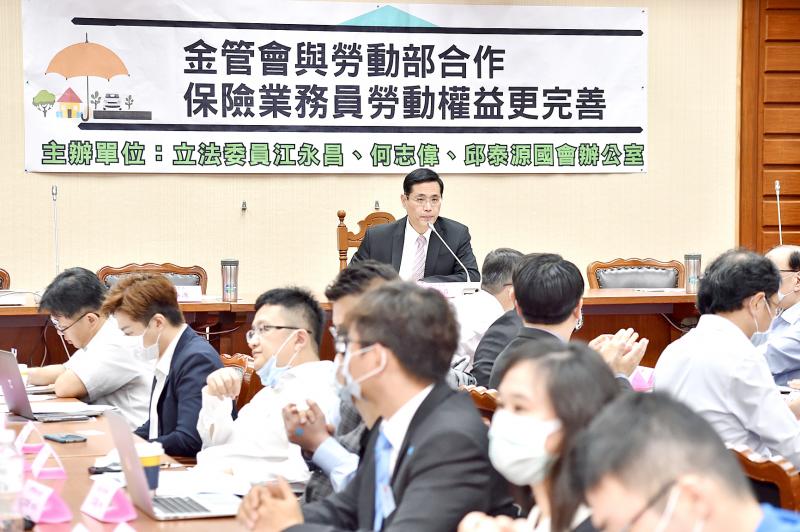Insurance agents and labor unions’ representatives yesterday criticized the Regulations Governing the Supervision of Insurance Solicitors (保險業務員管理規則) for giving too much power to insurance companies to penalize their sales agents.
The rules — aimed to prevent inappropriate marketing — allow companies to give rewards to or impose disciplinary measures on their agents, but firms have weaponized the rules and punished agents as they want, Republic of China Insurance Union Alliance director Chuang Ching-hsiang (莊敬祥) said at a public hearing at the Legislative Yuan in Taipei.
For example, Taiwan Life Insurance Co (台灣人壽保險), had punished agents for “disrupting order in the office,” while Mercuries Life Insurance Co (三商美邦人壽保險) required its agents to sign non-disclosure declarations and give up their legal rights, Chuang said.

Photo: Tu Chien-jung, Taipei Times
“Our colleagues were even fined for reposting media reports of Nan Shan Life Insurance Co’s (南山人壽) dubious transactions,” Nan Shan labor union president Tsai Kun-ying (蔡坤穎) said.
There are 380,000 agents in the nation, and most companies impose unreasonably strict disciplinary measures on them, alliance chairman Yan Ching-lung (嚴慶龍) said.
Companies can impose rules on their employees, according to the Labor Standards Act (勞基法), but most insurance agents are contracted workers and deserve fewer restrictions, Yan said.
The law also allows firms to cancel agents’ registrations, which prevents them from working in the industry for three years, he said.
“The rules are disproportional. Given that a mayor who is removed from office cannot run for election to the same office in three years, the punishment on an ordinary citizen should not be as severe,” Democratic Progressive Party (DPP) Legislator Mark Ho (何志偉) said.
The unions urged the Financial Supervisory Commission and the Ministry of Labor to work together to resolve the disputes.
Insurance Bureau Director-General Shih Chiung-hwa (施瓊華) said the commission would consider amending regulations to resolve the long-lasting disputes.
The commission would review as soon as possible the reports of unreasonable disciplinary measures, Shih said, adding that it would “consider whether the punishment of canceling agents’ registrations is too severe.”
“The disputes have existed for a long time, but we will not ignore them. We will fix them in cooperation with the Ministry of Labor,” she said.
DPP Legislator Chiang Yung-chang (江永昌) said the Insurance Act (保險法) should also be amended to be comply with labor regulations.

In Italy’s storied gold-making hubs, jewelers are reworking their designs to trim gold content as they race to blunt the effect of record prices and appeal to shoppers watching their budgets. Gold prices hit a record high on Thursday, surging near US$5,600 an ounce, more than double a year ago as geopolitical concerns and jitters over trade pushed investors toward the safe-haven asset. The rally is putting undue pressure on small artisans as they face mounting demands from customers, including international brands, to produce cheaper items, from signature pieces to wedding rings, according to interviews with four independent jewelers in Italy’s main

Japanese Prime Minister Sanae Takaichi has talked up the benefits of a weaker yen in a campaign speech, adopting a tone at odds with her finance ministry, which has refused to rule out any options to counter excessive foreign exchange volatility. Takaichi later softened her stance, saying she did not have a preference for the yen’s direction. “People say the weak yen is bad right now, but for export industries, it’s a major opportunity,” Takaichi said on Saturday at a rally for Liberal Democratic Party candidate Daishiro Yamagiwa in Kanagawa Prefecture ahead of a snap election on Sunday. “Whether it’s selling food or

CONCERNS: Tech companies investing in AI businesses that purchase their products have raised questions among investors that they are artificially propping up demand Nvidia Corp chief executive officer Jensen Huang (黃仁勳) on Saturday said that the company would be participating in OpenAI’s latest funding round, describing it as potentially “the largest investment we’ve ever made.” “We will invest a great deal of money,” Huang told reporters while visiting Taipei. “I believe in OpenAI. The work that they do is incredible. They’re one of the most consequential companies of our time.” Huang did not say exactly how much Nvidia might contribute, but described the investment as “huge.” “Let Sam announce how much he’s going to raise — it’s for him to decide,” Huang said, referring to OpenAI

The global server market is expected to grow 12.8 percent annually this year, with artificial intelligence (AI) servers projected to account for 16.5 percent, driven by continued investment in AI infrastructure by major cloud service providers (CSPs), market researcher TrendForce Corp (集邦科技) said yesterday. Global AI server shipments this year are expected to increase 28 percent year-on-year to more than 2.7 million units, driven by sustained demand from CSPs and government sovereign cloud projects, TrendForce analyst Frank Kung (龔明德) told the Taipei Times. Demand for GPU-based AI servers, including Nvidia Corp’s GB and Vera Rubin rack systems, is expected to remain high,